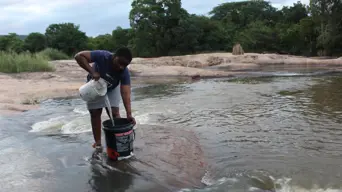Groundwater in South Africa under pressure, says expert
Anthony Turton, a trained scientist specialising in water resource management, warns that some of the country's key groundwater sources are being depleted faster than they can be replenished.

Residents of KaMajika Village near Hazyview collect water from the Kambeni River. Archive picture: Masoka Dube/GroundUp
702's Gugs Mhlungu spoke to Anthony Turton, a trained scientist specialising in water resource management.
Listen to their conversation in the audio clip below.
South Africa could be facing a silent water crisis as some of its most important underground water sources are being overused.
Groundwater is water stored deep underground in natural spaces between rocks, called aquifers.
"...groundwater is always important. It's not necessarily a big flow, but in parts of South Africa, it's all about the geology, what's known as the host geology. So the geological formations of the earth at that localised setting are what determines the amount of groundwater that we have available...South Africa has got some very, very well-established groundwater areas."
- Anthony Turton, trained scientist specialising in water resource management
Turton says areas like the West Rand, Lenasia, and Mahikeng are part of a major groundwater system that’s already showing signs of depletion.
He explains that groundwater is a critical supply for many rural areas.
"...groundwater is generally an extremely important resource because it's often found in areas of poverty where there is no other water available."
- Anthony Turton, trained scientist specialising in water resource management
"Wherever groundwater is a significant factor, it tends to have been overdrawn and over-abstracted."
- Anthony Turton, trained scientist specialising in water resource management
He adds that aquifers take varying amounts of time to refill, depending on their structure.
In some areas it may be a week, but in others, like the Nubian sandstone aquifer in North Africa, “it takes 10,000 years to recharge.”
Turton warns that if we keep using more water than nature can replace, we’ll face dry taps in the future.
Scroll up to listen to the full conversation